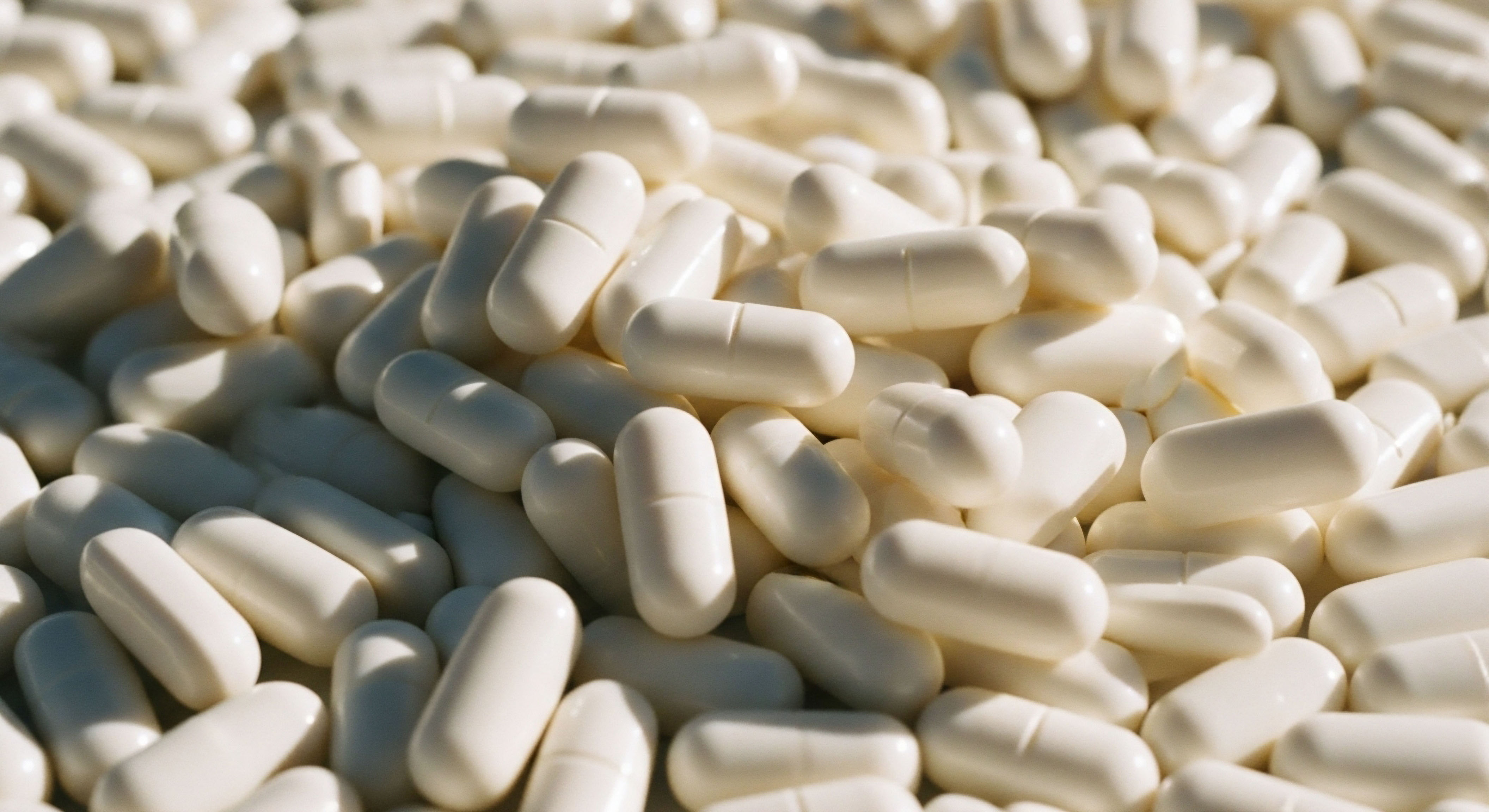

Fundamentals
Experiencing the multifaceted manifestations of Polycystic Ovary Syndrome, or PCOS, often presents a complex personal landscape. You may navigate persistent challenges such as irregular menstrual cycles, unexplained weight shifts, or persistent fatigue, all of which signal a deeper physiological narrative.
These lived experiences are not isolated incidents; they represent the intricate interplay of the body’s endocrine system, striving for equilibrium amidst subtle yet profound shifts. A primary concern for many individuals with PCOS involves the heightened propensity for developing type 2 diabetes, a metabolic trajectory that often feels predetermined. However, understanding the foundational biological mechanisms offers a pathway toward proactive engagement with your own health.
At its core, PCOS frequently involves a significant disruption in insulin signaling, a phenomenon termed insulin resistance. This condition means the body’s cells exhibit a reduced responsiveness to insulin, the hormone responsible for facilitating glucose uptake from the bloodstream. Consequently, the pancreas compensates by producing more insulin, leading to elevated circulating insulin levels, or hyperinsulinemia.
This perpetual state of heightened insulin production initiates a cascade of effects throughout the endocrine system, directly influencing ovarian function and contributing to the characteristic hormonal imbalances observed in PCOS, including elevated androgen levels.
PCOS symptoms reflect a complex endocrine system narrative, with insulin resistance serving as a central theme.
The prolonged presence of elevated insulin not only exacerbates androgen production in the ovaries, contributing to symptoms like hirsutism and acne, but also places a considerable strain on pancreatic beta cells. Over time, these cells may become exhausted, losing their capacity to produce sufficient insulin to manage blood glucose effectively.
This progression marks the transition from insulin resistance to impaired glucose tolerance and, ultimately, to type 2 diabetes. Recognizing this interconnectedness between insulin dynamics and hormonal health provides a profound opportunity for intervention. It underscores the potential for targeted lifestyle adherence to recalibrate these biological systems, thereby altering the course of metabolic progression.

Understanding Insulin’s Role in PCOS
Insulin, beyond its well-known function in glucose metabolism, acts as a potent signaling molecule throughout the body. In individuals predisposed to PCOS, genetic and environmental factors can conspire to diminish cellular sensitivity to insulin’s directives. This diminished sensitivity forces the body to elevate insulin output, creating a compensatory cycle. The ovaries, possessing insulin receptors, respond to these heightened insulin signals by increasing androgen synthesis. This contributes to the ovulatory dysfunction and other hallmark features of the syndrome.
The metabolic consequences extend beyond ovarian function, influencing fat storage, inflammatory pathways, and even neuroendocrine communication. A sustained state of hyperinsulinemia can promote visceral adiposity, which in itself is metabolically active and releases inflammatory cytokines, further impairing insulin sensitivity in a feedback loop. Appreciating these systemic effects reveals the pervasive influence of insulin dysregulation on overall physiological well-being.


Intermediate
For individuals familiar with the fundamental metabolic underpinnings of PCOS, the next logical inquiry centers on actionable strategies. Long-term lifestyle adherence presents a potent, non-pharmacological avenue for mitigating the progression toward type 2 diabetes. This involves a deliberate and sustained recalibration of daily habits, specifically targeting insulin sensitivity and metabolic efficiency. The efficacy of these protocols stems from their direct influence on cellular glucose uptake, inflammatory markers, and the intricate hormonal feedback loops governing energy balance.
Dietary modifications stand as a cornerstone of this intervention. A dietary pattern emphasizing whole, unprocessed foods, abundant in fiber, lean proteins, and healthy fats, significantly impacts postprandial glucose responses. Such an approach minimizes rapid spikes in blood glucose and subsequent insulin surges, allowing pancreatic beta cells to operate with greater efficiency.
Specific considerations include limiting refined carbohydrates and added sugars, which disproportionately contribute to insulin resistance. The sustained application of these nutritional principles helps to re-sensitize peripheral tissues to insulin’s effects, thereby reducing the metabolic burden.
Targeted lifestyle adjustments offer a powerful, non-pharmacological path to prevent type 2 diabetes progression in PCOS.
Exercise physiology also plays an indispensable role in enhancing metabolic function. Both aerobic activities and resistance training offer distinct yet complementary benefits. Aerobic exercise improves cardiovascular health and glucose utilization, while resistance training builds muscle mass. Muscle tissue represents a significant site for glucose disposal, and increasing its volume naturally improves insulin sensitivity.
Regular physical activity additionally modulates inflammatory pathways and supports overall endocrine system resilience, contributing to a more balanced hormonal milieu. The consistent integration of these movement patterns into daily life creates a sustained metabolic advantage.

Strategic Dietary Protocols for Insulin Sensitivity
Adopting a thoughtful dietary framework can profoundly influence insulin dynamics. Prioritizing complex carbohydrates, such as those found in vegetables, legumes, and whole grains, ensures a slower, more sustained release of glucose into the bloodstream. This contrasts sharply with the rapid absorption of simple sugars, which provoke an exaggerated insulin response. Adequate protein intake supports satiety and helps stabilize blood sugar, while healthy fats contribute to cellular integrity and hormonal synthesis.
Consideration of nutrient timing can further optimize metabolic responses. Consuming balanced meals at regular intervals helps regulate circadian rhythms and metabolic hormones. Avoiding prolonged fasting or erratic eating patterns supports consistent glucose management. This structured approach helps the body maintain a more stable metabolic state throughout the day, reducing the physiological stress that can exacerbate insulin resistance.

Dietary Components and Their Metabolic Impact
| Dietary Component | Metabolic Impact | Rationale for PCOS Management |
|---|---|---|
| Fiber-Rich Foods (Vegetables, Legumes) | Slows glucose absorption, improves gut health | Stabilizes blood sugar, reduces insulin spikes |
| Lean Proteins (Poultry, Fish, Tofu) | Promotes satiety, supports muscle maintenance | Minimizes overeating, aids glucose regulation |
| Healthy Fats (Avocado, Nuts, Olive Oil) | Enhances satiety, provides sustained energy | Supports cellular function, hormonal balance |
| Refined Carbohydrates (White Bread, Sugary Drinks) | Rapid glucose spikes, insulin surges | Minimizing intake reduces insulin resistance burden |

Exercise Physiology and Hormonal Recalibration
Integrating a consistent exercise regimen serves as a powerful physiological modulator. Regular physical activity directly enhances the translocation of GLUT4 transporters to muscle cell membranes, facilitating glucose uptake independent of insulin. This acute effect, sustained over time, contributes significantly to improved whole-body insulin sensitivity. Furthermore, exercise reduces systemic inflammation, a factor often implicated in the exacerbation of insulin resistance in PCOS.
The benefits extend to body composition, with reductions in visceral adipose tissue. This specific type of fat is highly metabolically active, secreting adipokines that can further impair insulin signaling. By diminishing visceral fat, exercise helps break a vicious cycle of inflammation and insulin resistance. The consistent practice of physical activity acts as a potent endocrine system support, fostering a more harmonious metabolic state.
- Aerobic Exercise ∞ Improves cardiovascular fitness and enhances the body’s capacity to utilize glucose for energy, promoting overall metabolic efficiency.
- Resistance Training ∞ Increases muscle mass, which serves as a primary site for glucose storage and utilization, thereby directly improving insulin sensitivity.
- Regular Movement ∞ Supports consistent blood glucose regulation and contributes to a reduction in inflammatory markers throughout the body.


Academic
The question of whether long-term lifestyle adherence can prevent the progression to type 2 diabetes in PCOS transcends simple observational correlation, necessitating a deep exploration into the molecular and cellular underpinnings of metabolic dysregulation. From an academic perspective, this inquiry demands an understanding of the intricate interplay between genetic predispositions, epigenetics, and the systemic effects of chronic low-grade inflammation on insulin signaling pathways.
The sustained efficacy of lifestyle interventions hinges on their capacity to induce adaptive changes at these fundamental biological levels, effectively recalibrating the cellular environment.
A central tenet involves the detailed analysis of insulin receptor signaling cascades. In PCOS, studies frequently reveal post-receptor defects in insulin action, impacting glucose transporter (GLUT4) translocation and glycogen synthesis. Long-term adherence to a carefully constructed lifestyle protocol, particularly one emphasizing reduced glycemic load and regular physical activity, influences these intracellular pathways.
Such adherence can upregulate insulin receptor expression, enhance tyrosine phosphorylation of insulin receptor substrate (IRS) proteins, and improve downstream signaling through the PI3K/Akt pathway, ultimately restoring cellular responsiveness to insulin. This represents a biochemical recalibration, moving beyond symptomatic management to address core cellular dysfunction.
Lifestyle adherence in PCOS promotes adaptive molecular changes, recalibrating cellular insulin signaling and metabolic pathways.

Molecular Mechanisms of Lifestyle-Induced Metabolic Adaptation
The sustained benefits of lifestyle interventions in PCOS extend to gene expression and epigenetic modifications. Regular exercise and specific dietary patterns influence the activity of sirtuins, AMPK, and other metabolic sensors that regulate mitochondrial biogenesis, oxidative phosphorylation, and fatty acid oxidation.
For instance, increased physical activity upregulates PGC-1α, a master regulator of mitochondrial function, leading to improved energy metabolism and reduced oxidative stress. These molecular adaptations collectively enhance cellular energy efficiency and mitigate the lipotoxicity often associated with chronic hyperinsulinemia.
Furthermore, the gut microbiome emerges as a significant, yet often underappreciated, modulator of metabolic health in PCOS. Dysbiosis, characterized by an imbalance in gut microbial populations, can contribute to systemic inflammation and impaired glucose metabolism through mechanisms involving lipopolysaccharide (LPS) production and short-chain fatty acid (SCFA) synthesis.
Dietary fiber, a cornerstone of beneficial lifestyle changes, acts as a prebiotic, fostering a diverse and healthy gut microbiota. This, in turn, can reduce gut permeability, lower systemic inflammation, and improve insulin sensitivity, thereby offering a multi-systemic therapeutic effect.

Biomarkers of Metabolic Improvement with Lifestyle Interventions
Monitoring specific biomarkers provides quantifiable evidence of the profound physiological shifts induced by long-term lifestyle adherence. These markers offer insights into the efficacy of interventions at a systemic level, allowing for precise adjustments to personalized wellness protocols.
- Fasting Insulin ∞ A direct indicator of insulin resistance, with reductions signaling improved cellular responsiveness.
- HbA1c ∞ Reflects average blood glucose levels over several months, providing a robust measure of long-term glycemic control.
- Adiponectin ∞ An adipokine with insulin-sensitizing and anti-inflammatory properties; increased levels correlate with improved metabolic health.
- High-Sensitivity C-Reactive Protein (hs-CRP) ∞ A marker of systemic inflammation, with reductions indicating a decrease in chronic inflammatory states.
- Homeostatic Model Assessment for Insulin Resistance (HOMA-IR) ∞ A calculated value reflecting insulin resistance and beta-cell function, offering a comprehensive metabolic assessment.

The Endocrine System’s Interconnectedness ∞ A Systems Biology Perspective
Viewing PCOS through a systems biology lens reveals the profound interconnectedness of various endocrine axes. The hypothalamic-pituitary-adrenal (HPA) axis, governing the stress response, frequently exhibits dysregulation in individuals with PCOS. Chronic stress elevates cortisol levels, which can further impair insulin sensitivity and exacerbate androgen production.
Lifestyle interventions that incorporate stress reduction techniques, such as mindfulness or adequate sleep hygiene, modulate HPA axis activity, thereby indirectly supporting metabolic and hormonal balance. This illustrates how a holistic approach, addressing psychological and physiological stressors, reinforces the direct metabolic benefits of diet and exercise.
The intricate feedback loops between the HPG axis, insulin signaling, and adipose tissue further underscore this interconnectedness. Insulin acts as a trophic factor for ovarian androgen production, while elevated androgens can, in turn, worsen insulin resistance. Adipose tissue, beyond its role in energy storage, functions as an active endocrine organ, secreting adipokines that influence both insulin sensitivity and reproductive hormones.
Long-term lifestyle modifications disrupt these maladaptive feedback loops, promoting a more balanced hormonal milieu and reducing the metabolic drivers of PCOS progression. This complex interplay signifies that sustained adherence represents a comprehensive biochemical recalibration, fostering a return to physiological harmony.

References
- Dunaif, Andrea, and Ricardo Azziz. “The polycystic ovary syndrome ∞ A clinical update.” The Journal of Clinical Endocrinology & Metabolism, vol. 96, no. 12, 2011, pp. 3509-3522.
- Teede, Helena J. et al. “Recommendations for the management of PCOS ∞ An international evidence-based guideline.” Human Reproduction Update, vol. 24, no. 2, 2018, pp. 139-173.
- Moran, Lisa J. et al. “The role of diet in the management of polycystic ovary syndrome.” Human Reproduction Update, vol. 19, no. 1, 2013, pp. 1-13.
- Harrison, Cherie L. et al. “Exercise therapy in polycystic ovary syndrome ∞ A systematic review.” Human Reproduction Update, vol. 17, no. 2, 2011, pp. 171-183.
- Diamanti-Kandarakis, Evanthia, and Andrea Dunaif. “Insulin resistance and the polycystic ovary syndrome revisited ∞ An update on mechanisms and implications.” Endocrine Reviews, vol. 33, no. 6, 2012, pp. 981-1030.
- Lim, S. S. et al. “Lifestyle changes in women with polycystic ovary syndrome.” Cochrane Database of Systematic Reviews, no. 11, 2019, Art. No. ∞ CD007506.
- Spritzer, Poli Mara. “Polycystic ovary syndrome ∞ A review of the pathophysiology and management.” Arquivos Brasileiros de Endocrinologia & Metabologia, vol. 53, no. 2, 2009, pp. 159-168.

Reflection
The journey toward understanding your biological systems, particularly in the context of PCOS and its metabolic implications, marks a significant personal commitment. The knowledge presented here offers a comprehensive framework, illustrating the profound capacity of sustained lifestyle adherence to influence complex physiological pathways.
Consider this information not as a definitive endpoint, but as a foundational map guiding your individual path. Reclaiming vitality and optimal function without compromise necessitates ongoing introspection and a willingness to engage with your unique biological narrative. Your proactive engagement with these principles becomes the most powerful tool in shaping your long-term health trajectory.



